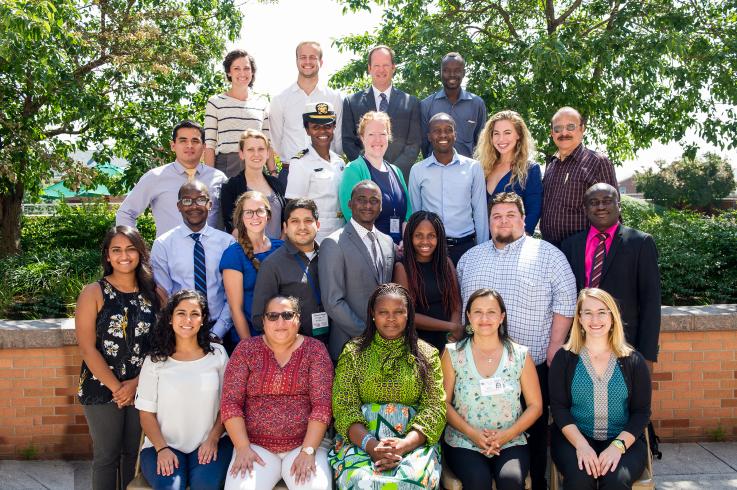
The National Institutes of Health has renewed its support for University of Washington (UW) as a leader in developing the next generation of physicians, veterinarians, dentists, and scientists trained in global health with a $4.5 million grant to extend the Northern Pacific Fogarty Global Health Fellows (NPGH) training program for the next five years (2017–2022). Support is provided through the Fogarty International Center, which will distribute awards totaling more than $25.9 million to six consortia that include 24 U.S. universities with 35 international partnering universities and institutions.
UW is the principal institution of the NPGH consortium, directed by Joe Zunt, MD, MPH, Professor of Global Health and Neurology at UW, and will work with program co-directors Shailendra Prasad, MD, MPH, of the University of Minnesota, Vivek Nerurkar, PhD, of the University of Hawaii, and Joseph Kolars, MD, of the University of Michigan. The NPGH consortium received an initial five-year grant in 2012 to develop an 11-month clinical research-training program for young investigators to work in low- and middle-income countries around the world. Since its inception, the consortium has supported 117 fellows who have worked with partners in Kenya, Peru, Thailand, Cameroon, Ghana, China, India, and Uganda.
“As a medical student, the Fogarty fellowship is a rare opportunity to take dedicated time to pursue global health research under close and personable mentorship. As someone who wants to make a career of collaborating with others around the world, this program is a solid stepping stone,” said Fritz Siegert, who will spend his fellowship year examining sickle cell anemia in Uganda.
UW has a history of demonstrated impact with Fogarty’s support for the NPGH program through the research, training, and mentoring of health professionals who have gone on to make significant global health discoveries and contributions both during and after their fellowship. A few examples of these accomplishments include:
- Fogarty trainees in Latin America and Africa developed low-cost, accurate rapid diagnostic tests and treatments for syphilis, Hepatitis B, and HIV. By testing innovations abroad, new diagnostic tests can quickly be proven effective and reach the shelves of U.S. laboratories before patients need them.
- UW General Surgery residents Barclay Stewart, MD, MSc, Lacey LaGrone MD, MPH, and Cameron Gaskill, MD, MPH examined barriers to essential surgical care in West Africa and Latin America. Their projects have helped to integrate surgical, trauma, and burn care into the national health plans of Ghana and Peru and to inform World Health Organization (WHO) guidelines on Trauma Quality Improvement Programs. Jointly, they have published more than seventy manuscripts — strengthening UW’s role as an emerging hub for global surgery.
- The Mamas del Rio (Mama River in English) program trains traditional midwives to use smartphones to locate and collect information from pregnant women in the Amazon; schedule antenatal care visits with mobile medical staff; and send alerts to mobile health professionals when a high-risk pregnancy is identified. Developed and directed by Magaly Blas, MD, MPH, PhD, a former Fogarty fellow and UW Affiliate Associate Professor, this program has provided opportunities for medical students from the UW (Hilary Zetlan, MD), University of Pennsylvania (Neha Limaye, MD) and Universidad Peruana Cayetano Heredia in Peru (Andrea Rivas Nieto, MD) to participate in the design and implementation of research projects.
The 2017–2018 class of Fogarty NPGH fellows includes five UW graduate students, medical students, and residents working on health topics ranging from sickle cell anemia in Uganda to mental health of transgender persons living with HIV in Thailand. Their projects include:
Michelle Dumond, recent graduate of the UW Family Medicine Residency Program: “Mental Health Screening in HIV Positive Transgender Persons in Bangkok, Thailand,” Bangkok, Thailand
Jessica Long, PhD student, Department of Epidemiology: “Understanding Sexual Partnerships among HIV-Infected Transgender Women in Lima, Peru to Improve Targeted HIV Interventions,” Lima, Peru
Renee Newby, 3rd year medical student, School of Medicine: “Early Diagnosis of Tuberculosis Meningitis to Promote Improved Outcomes,” Lima, Peru
Thomas Fritz Siegert, 3rd year medical student, School of Medicine: “Micronutrient Deficiency in Sickle Cell Anemia,” Kampala, Uganda
Samantha Zwicker, PhD student, School of Environmental and Forest Services: “Assessment of Water Quality in Two Impoverished River Communities in Iquitos and Puerto Maldonado, Peru,” Iquitos, Peru
The Fogarty International Center (FIC), part of the U.S. National Institutes of Health, supports basic, clinical, and applied research and training for U.S. and foreign investigators working in low- and middle-income countries. The FIC was founded 50 years ago, in honor of Congressman John Fogarty, a champion for biomedical research and particularly for global health research. Since its inception, approximately 6,000 scientists worldwide have received research training through Fogarty programs.
More information regarding the NPGH program is available at www.fogartyfellows.org. Applications for the 2018–2019 cohort are currently being accepted.
(By Alex Murphy)